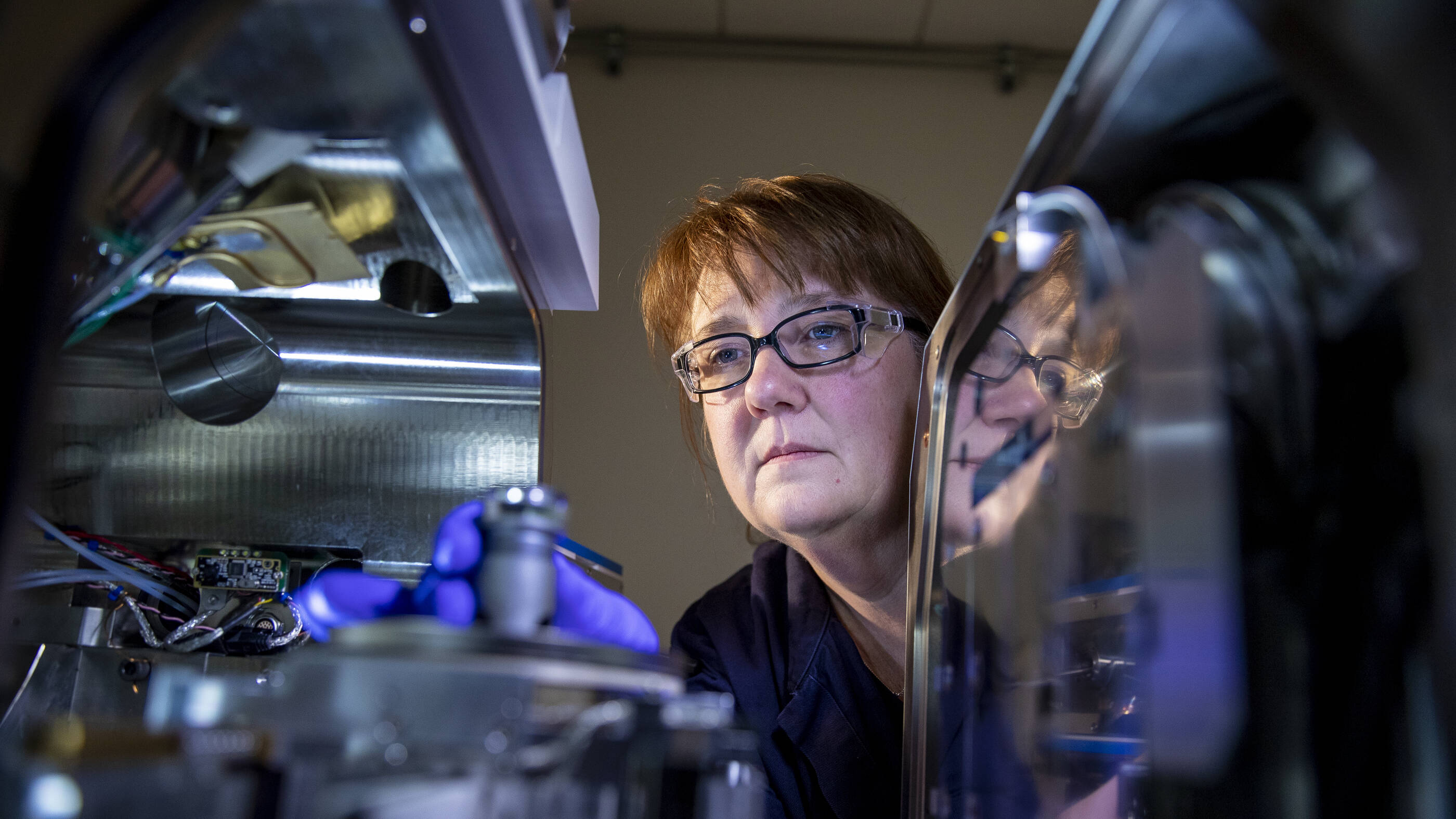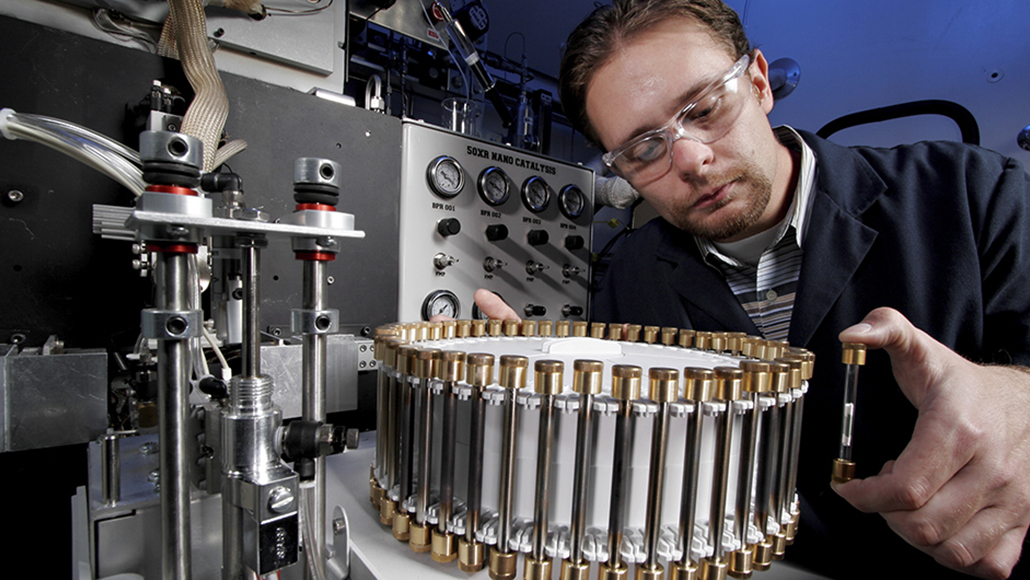Collaborating with leading universities to meet global energy demand
In this article
Massachusetts Institute of Technology
In October 2014, ExxonMobil became a founding member of the MIT Energy Initiative (MITEI), a unique collaboration aimed at working together to advance and explore the future of energy focused on new energy sources and more efficient use of conventional energy resources; the 5-year agreement was renewed in October, 2019 at the founding member level. Since launching the collaboration with MIT, the joint research program has made inroads into several areas, including bio-inspired catalysts for the petrochemical industry and computational modeling to better understand the properties of iron and iron-based alloys used in pipelines.
ExxonMobil has also joined three of the MITEI Low Carbon Energy Centers – Energy Storage, Mobility, and the Carbon Capture, Utilization, and Storage (CCUS) Center – first called for in MIT’s Plan for Action on Climate Change in October 2015. The CCUS Center was established to advance research on specific, key technologies to address climate change such as electric power systems, energy bioscience, energy storage, materials for energy and extreme environments, advanced nuclear energy systems, nuclear fusion and solar energy, in addition to CCUS. ExxonMobil also funds several MIT students as ExxonMobil Fellows each year through the Energy Initiative, as well as multiple summer undergraduate research projects.
The University of Texas at Austin
In July 2016, ExxonMobil announced a $15 million investment as a Leadership member of the University of Texas at Austin Energy Institute to pursue technologies to help meet growing energy demand while reducing environmental impacts and the risk of climate change. Since then, the joint research initiative has studied transformational energy innovations, including integrating renewable energy sources into the current supply mix and advancing traditional energy sources in ways that improve efficiency and reduce impacts on water, air and climate. To date the partnership has enabled more than 40 projects, covering a range of critical technology areas, including carbon capture and storage, novel battery technologies, beneficial reuse of water, and future energy infrastructure needs. Impactful energy solutions require integrated, multi-disciplinary efforts. Therefore, this partnership takes advantage of the university’s strengths in law, business, and public policy, as well as its technical expertise to advance solutions to the dual energy challenge.
Georgia Institute of Technology
ExxonMobil’s relationship with Georgia Tech goes back nearly 15 years and has produced innovations in many separation technologies, including a new carbon-based molecular sieve membrane that could dramatically reduce the energy required to separate a class of hydrocarbon molecules known as alkyl aromatics.
Most recently – inspired by previous research surrounding reverse osmosis technology that has reduced energy intensity for water purification – Scientists from ExxonMobil, the Georgia Institute of Technology and Imperial College of London have published joint research on potential breakthroughs in a new membrane technology that could reduce emissions and energy intensity associated with refining crude oil. Laboratory tests indicate the patent-pending membrane could be used to augment some heat-intensive distillation at refineries in the years ahead.
Stanford University
ExxonMobil is a founding member of the Global Climate and Energy Project (GCEP), at Stanford University, which developed fundamental, game-changing scientific breakthroughs that could lead to lower greenhouse gas emissions and a less carbon-intensive global energy system. The GCEP was completed in 2019, sponsored 100 research programs in the United States, Europe, Australia, China and Japan, and backed the development of more than 60 technologies and the issuance of more than 15 patents.
Building upon the success from this collaboration, in 2018, ExxonMobil pledged $20 million over five years to the Stanford Strategic Energy Alliance (SEA), with new programs starting in 2019. A diverse span of research programs is currently underway on topics such as large scale carbon storage, electrical energy storage with flow batteries, efficient hydrogen production, computer science / machine learning, high efficiency / low carbon intensity natural gas engine combustion fundamentals, lifecycle studies of polymer composites for new building materials, and a new program to explore the stability and efficiency limits of perovskite-based solar materials.
In addition, ExxonMobil funds three Stanford Industrial Affiliates programs as a part of the SEA agreement: the Natural Gas Initiative, the Stanford Center for Carbon Storage, and Storage-X, and has participated in the highly prominent Global Energy Forums.
Singapore Energy Center
In 2018, ExxonMobil became the founding member of the Singapore Energy Center (SgEC), a collaboration between two of Singapore’s leading universities: the Nanyang Technological University (NTU) and the National University of Singapore (NUS). The SgEC, the first of its kind outside of the United States, fosters interdisciplinary research collaboration between academia and industry with a focus on energy innovation and lower emissions technologies relevant for Southeast Asia.
Researchers at the Singapore Energy Center are developing novel processes and materials that could help reduce CO2 emissions from power and industrial sources. This includes technologies that enhance the efficiency of fuel and chemical production, increase options for low carbon hydrogen and sustainable polymers, and enable regional CO2 capture and sequestration options.
And many more
ExxonMobil is funding a broad portfolio of biofuels research programs including our ongoing efforts on algae as well as programs on converting alternative, non-food based biomass feedstocks, such as cellulosic biomass, to advanced biofuels. We are working with some of these leading scientists and engineers at universities, government laboratories and companies and have designed our research portfolio to progress the science that we feel will be needed to deliver advanced biofuels with environmental benefits.
University research collaborations
The list of universities and research institutions with which ExxonMobil has partnered in recent years includes:
Beijing University of Chemical Technology
California Institute of Technology
Carnegie Mellon University
Case Western Reserve University
Changchun Institute of Applied Chemistry
City College of New York
College of William and Mary
Colorado School of Mines
Cornell University
Delft University of Technology
Drexel University
Duke University
Dutch Polymer Institute
Florida State University
George Mason University
Georgia Institute of Technology
Heriot-Watt University
Imperial College London
Jacobs University Bremen
Jiangsu University
Joseph Fourier University
Louisiana State University
Massachusetts Institute of Technology
Michigan State University
Montana State University
Moscow State University
Nanyang Technological University
National University of Singapore
New York University Abu Dhabi
Newcastle University
North Carolina State University
Norwegian University of Science and Technology
Pohang University of Science and Technology
Purdue University
Qatar University
Rice University
South China Institute of Technology
Stanford University
Texas A&M University
Texas A&M University at Galveston
Tsinghua University
University College Dublin
University of Alberta
University of Bristol
University of British Columbia
University of Calgary
University of California, Berkeley
University of California, Irvine
University of California, Riverside
University of California, San Diego
University of California, Santa Barbara
University of Cambridge
University of Delaware
University of Florida
University of Hawaii
University of Houston
University of Illinois at Chicago
University of Illinois at Urbana-Champaign
University of Leeds
University of Massachusetts Amherst
University of Miami
University of Michigan
University of Minnesota
University of Mons
University of North Texas
University of Notre Dame
University of Oklahoma
University of St. Thomas
University of Southern Mississippi
University of Stockholm
University of Strasbourg
University of Texas at Austin
University of Texas at El Paso
University of Tulsa
University of Vermont
University of Washington
University of Wisconsin
University of Wyoming
Utrecht University
Virginia Polytechnic Institute and State University
Vrije Universiteit Brussel
Western Michigan University
Related content

Advancing Science: Partnering with the Department of Energy’s National Labs
ExxonMobil will work with the Department of Energy’s National Labs to bring lower emission technologies to commercial scale. This work includes collaborative research in areas such as biofuels, carbon capture and storage, and lifecycle analysis.
Voices from the University of Texas labs
